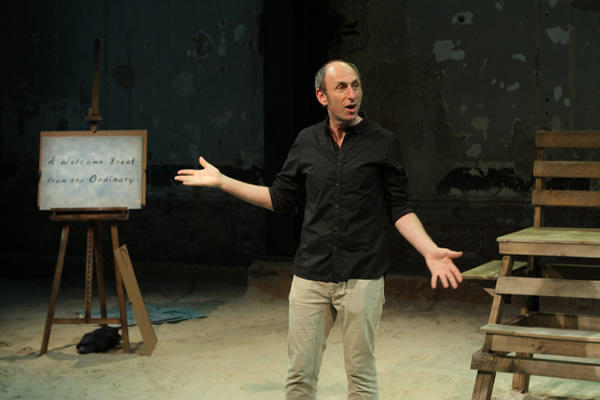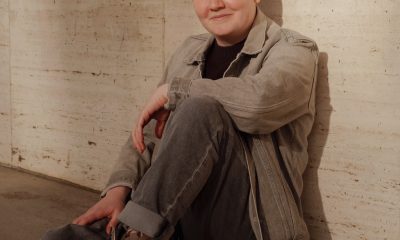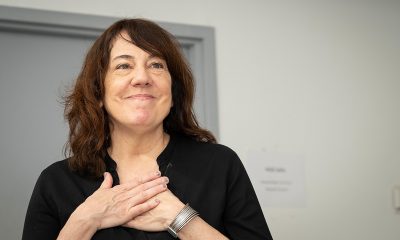Arts & Entertainment
Down by the seashore
Studio’s one-man show a clever exploration of longing and passion

‘The History of Kisses’
Through July 3
The Studio Theatre, 1501 14th St. NW
202-332-3300
www.studiotheatre.com‘Purge’
Through July 3
SCENA Theatre
at H Street Playhouse, 1365 H St. NE
703-683-2824 begin_of_the_skype_highlighting
www.scenatheater.org
Standing on a stage disguised as a stretch of sandy beach, a lone actor dressed in casual street clothes breaks out into his rendition of an old English seafarer’s chantey. He beckons his listeners to follow him to unknown places and because his song is so full of longing, promise and mystery, we gladly go along for the journey.
“The History of Kisses” — David Cale’s terrific one-man show making its world premiere at Studio Theatre — is a collection of interconnected monologues detailing mostly random erotic encounters that take place close to and on the ocean. The work’s central and most likable character James (a gay writer like Cale) is temporarily holed-up in a seaside California motel working on a collection of stories about desire and epiphany. His motel neighbors and a few more established friends are the subject of his intimate sketches.
Slim and bald, Cale (who not only performs but wrote the show) wholly inhabits his characters whether it’s Julie, a generally sensible woman who happily recalls her brief but memorable affair with a sexy fat man she picked up on a flight from New York to San Francisco; or Artie, an old married builder from New York who shares about a long ago, chance romantic encounter with Judy Garland on the beach in Malibu.
Moments move from funny to poignant. In a dream sequence, Cale transforms into an Australian surfing Adonis who doubles as the motel’s front desk clerk and funnily gives pointers on how to physically please a “Sheila” (i.e. woman in his Aussie jargon). That same surfer is later brokenhearted when his new married girlfriend dumps him, but ultimately finds dramatic renewal from the sea when he’s literally uplifted by a herd of whales. Love-weary James shares his own chance encounter with a middle-aged dentist who has recently come out.
Cale is a masterful storyteller. His long and impressive bio includes films, Broadway and music. He’s written lyrics for Elvis Costsello and Deborah Harry. “The History of Kisses” is his fourth solo work he’s done at Studio. While here and there British-born Cale’s American accents are a little shaky, the way in which he captures his characters’ physicality is uncanny — he can play both older women and young studs convincingly. His quirky, vulnerable subjects are finely drawn. The material is personal, fun, and even a little heartbreaking. Ultimately, Cale offers an inspiring testimony to human resilience.
Across town at the H Street Playhouse where SCENA is presenting Finnish-Estonian playwright Sofi Oksanen’s “Purge,” life is dangerous and memories are more painful. Set in both 1991 Estonia as well 1950s Estonia under Soviet rule, the bold drama tells the story of three generations of women who are the victims of sexual violence and the ongoing trauma that ensues.
Tucked away in her rustic, neatly tended dwelling old Aliide (Kerry Waters) bides her time in a changing world. Despite misgivings, she gives refuge to Zara (Colleen Delaney), a badly beaten woman on the run from pimps. In flashbacks we learn the old woman’s younger self (Irina Koval) and her young niece were once abused by Soviet soldiers.
While most of the work’s horrific violence is implied, interestingly the work’s most combative scene is a knock down drag out fight pitting Zara against old Aliide. The altercation, which includes Zara shoving the old woman’s heads in a full bed chamber, actually leads to the two women fully understanding one other, forging a bond and in the end, redemption.
To portray the tale’s strong women, director Robert McNamara has assembled an impressive trio: Waters and Koval are equally strong yet flawed as young and old Aliide. Delaney is known for giving theatergoers their money’s worth, and her emotionally strung out Zara is no exception. Eric Lucas offers some comic relief as Aliide’s communist doctrinaire husband, and Lee Ordeman is appropriately handsome and restless as young Aliide’s unrequited love. Stas Wronka and Armand Sindoni play the heavies (Soviet soldiers and pimps).
The playwright Oksanen identifies as bisexual. In 2009 she received an award from the organizers of Helsinki Pride for her activism on behalf of LGBT people in the Baltic states (Estonia, Latvia, Lithuania) and Russia. “Purge” also exists as a novel and a French film version is set to be released in 2012.

Team DC, the umbrella organization for LGBTQ-friendly sports teams and leagues in the D.C. area, held its annual Night of Champions Awards Gala on Saturday, April 20 at the Hilton National Mall. The organization gave out scholarships to area LGBTQ student athletes as well as awards to the Different Drummers, Kelly Laczko of Duplex Diner, Stacy Smith of the Edmund Burke School, Bryan Frank of Triout, JC Adams of DCG Basketball and the DC Gay Flag Football League.
(Washington Blade photos by Michael Key)




















The 2024 National Cannabis Festival was held at the Fields at RFK Stadium on April 19-20.
(Washington Blade photos by Michael Key)
















Covering the @NatlCannaFest at RFK Stadium for @WashBlade . Stop by the LGBTQ+ booth and pick up a paper if you are here. pic.twitter.com/is7hnsaPns
— Michael Patrick Key (@MichaelKeyWB) April 20, 2024
Theater
‘Amm(i)gone’ explores family, queerness, and faith
A ‘fully autobiographical’ work from out artist Adil Mansoor

‘Amm(i)gone’
Thorough May 12
Woolly Mammoth Theatre
641 D St., N.W.
$60-$70
Woollymammoth.net
“Fully and utterly autobiographical.” That’s how Adil Mansoor describes “Amm(i)gone,” his one-man work currently playing at Woolly Mammoth Theatre.
Both created and performed by out artist Mansoor, it’s his story about inviting his Pakistani mother to translate Sophocles’s Greek tragedy “Antigone” into Urdu. Throughout the journey, there’s an exploration of family, queerness, and faith,as well as references to teachings from the Quran, and audio conversations with his Muslim mother.
Mansoor, 38, grew up in the suburbs of Chicago and is now based in Pittsburgh where he’s a busy theater maker. He’s also the founding member of Pittsburgh’s Hatch Arts Collective and the former artistic director of Dreams of Hope, an LGBTQ youth arts organization.
WASHINGTON BLADE: What spurred you to create “Amm(i)gone”?
ADIL MANSOOR: I was reading a translation of “Antigone” a few years back and found myself emotionally overwhelmed. A Theban princess buries her brother knowing it will cost her, her own life. It’s about a person for whom all aspirations are in the afterlife. And what does that do to the living when all of your hopes and dreams have to be reserved for the afterlife?
I found grant funding to pay my mom to do the translation. I wanted to engage in learning. I wanted to share theater but especially this ancient tragedy. My mother appreciated the characters were struggling between loving one another and their beliefs.
BLADE: Are you more director than actor?
MANSOOR: I’m primarily a director with an MFA in directing from Carnegie Mellon. I wrote, directed, and performed in this show, and had been working on it for four years. I’ve done different versions including Zoom. Woolly’s is a new production with the same team who’ve been involved since the beginning.
I love solo performance. I’ve produced and now teach solo performance and believe in its power. And I definitely lean toward “performance” and I haven’t “acted” since I was in college. I feel good on stage. I was a tour guide and do a lot of public speaking. I enjoy the attention.
BLADE: Describe your mom.
MANSOOR: My mom is a wonderfully devout Muslim, single mother, social worker who discovered my queerness on Google. And she prays for me.
She and I are similar, the way we look at things, the way we laugh. But different too. And those are among the questions I ask in this show. Our relationship is both beautiful and complicated.
BLADE: So, you weren’t exactly hiding your sexuality?
MANSOOR: In my mid-20s, I took time to talk with friends about our being queer with relation to our careers. My sexuality is essential to the work. As the artistic director at Dreams of Hope, part of the work was to model what it means to be public. If I’m in a room with queer and trans teenagers, part of what I’m doing is modeling queer adulthood. The way they see me in the world is part of what I’m putting out there. And I want that to be expansive and full.
So much of my work involves fundraising and being a face in schools. Being out is about making safe space for queer young folks.
BLADE: Have you encountered much Islamophobia?
MANSOOR: When 9/11 happened, I was a sophomore in high school, so yes. I faced a lot then and now. I’ve been egged on the street in the last four months. I see it in the classroom. It shows up in all sorts of ways.
BLADE: What prompted you to lead your creative life in Pittsburgh?
MANSOOR: I’ve been here for 14 years. I breathe with ease in Pittsburgh. The hills and the valleys and the rust of the city do something to me. It’s beautiful, it’ affordable, and there is support for local artists. There’s a lot of opportunity.
Still, the plan was to move to New York in September of 2020 but that was cancelled. Then the pandemic showed me that I could live in Pittsburgh and still have a nationally viable career.
BLADE: What are you trying to achieve with “Amm(i)gone”?
MANSOOR: What I’m sharing in the show is so very specific but I hear people from other backgrounds say I totally see my mom in that. My partner is Catholic and we share so much in relation to this.
I hope the work is embracing the fullness of queerness and how means so many things. And I hope the show makes audiences want to call their parents or squeeze their partners.
-

 South America4 days ago
South America4 days agoDaniel Zamudio murderer’s parole request denied
-

 Maryland4 days ago
Maryland4 days agoMontgomery County police chief discusses arrest of trans student charged with planned school shooting
-

 Commentary5 days ago
Commentary5 days agoWorld ‘isn’t much different today’
-

 Theater4 days ago
Theater4 days ago‘Amm(i)gone’ explores family, queerness, and faith












